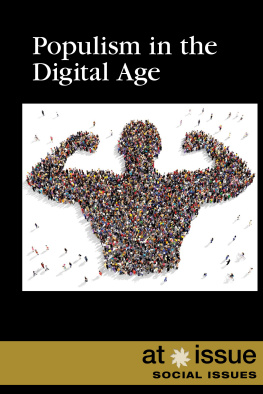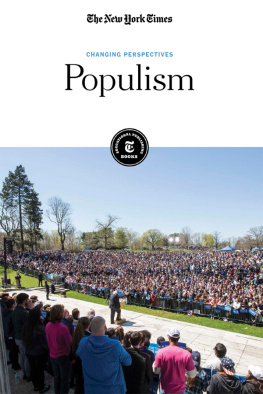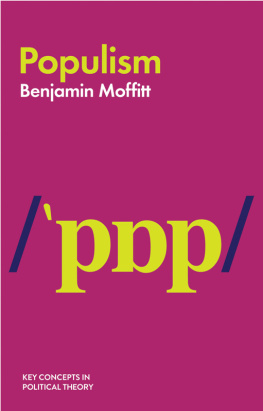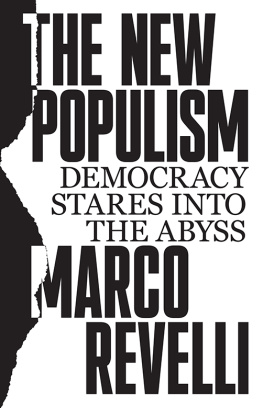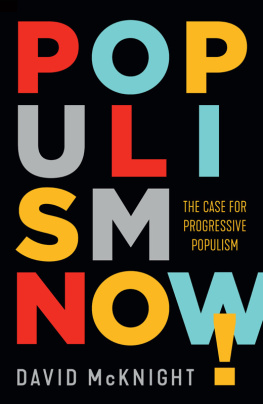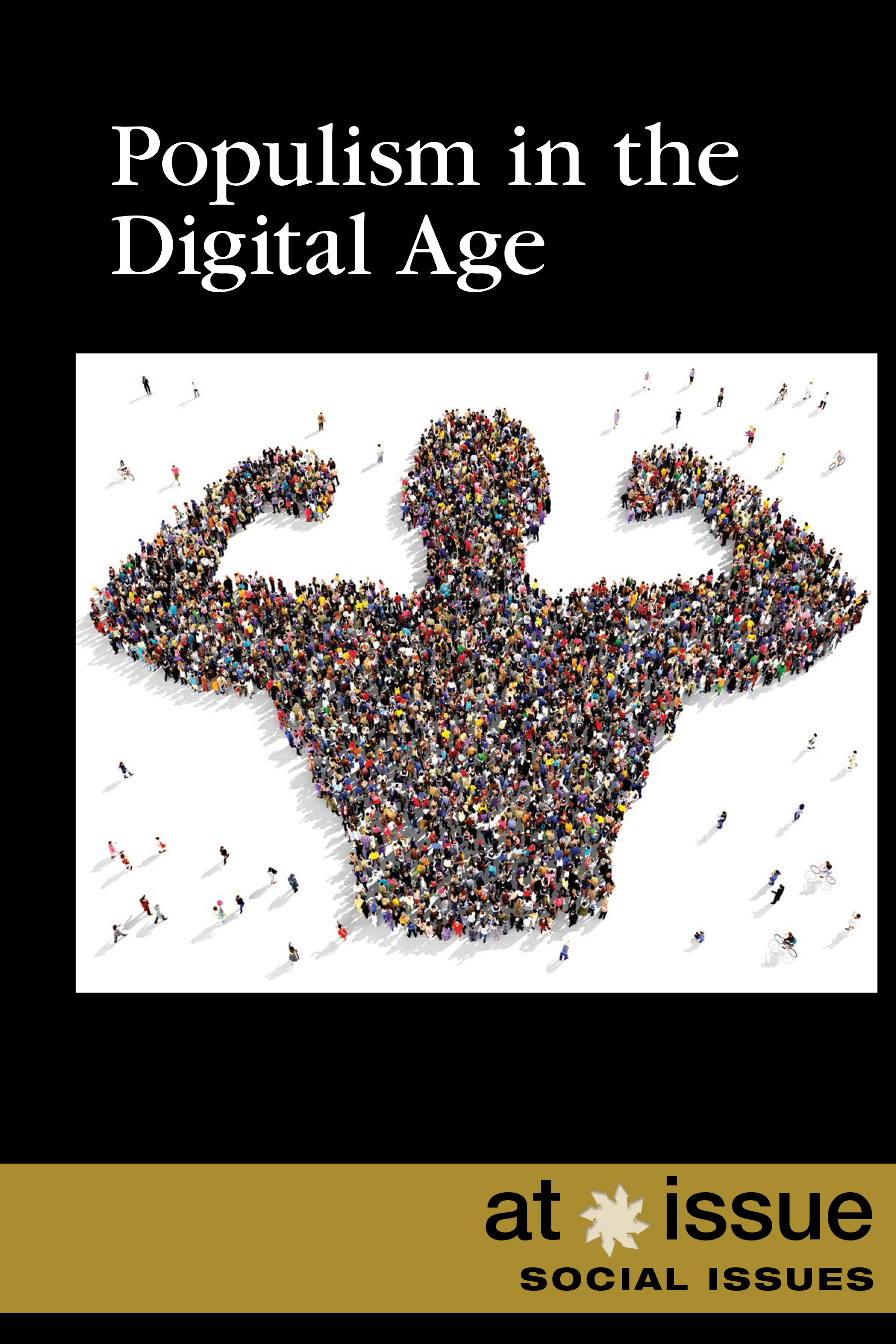- 1.The Origin of Populism
Nancy MacLean - 2.Left and Right Wing Populism
Thomas DeMichele - 3. Understanding the Black Lives Matter Movement
Iris Wijers - 4.Bernie Sanderss Populism Versus Racial Justice
Dara Lind - 5.What Is Digital Populism?
Paul Florence and Roderick Jones - 6.Social Media, Chaotic Pluralism, and Populism
Helen Margetts - 7. The Spoiler Candidates
Daniel Bush - 8.A History of Third Parties
Freeman Stevenson - 9.Sanders, Socialism, and Political Power
Philip Locker - 10.Contemporary Populisms Unstable Meaning
Charles Postel - 11.The Democratic Partys Empty Populism
Socialist Worker - 12.The Threat of a Networked Public Sphere
Vyacheslav Polonski
Published in 2018 by Greenhaven Publishing, LLC
353 3rd Avenue, Suite 255, New York, NY 10010
Copyright 2018 by Greenhaven Publishing, LLC First Edition
All rights reserved. No part of this book may be reproduced in any form without permission in writing from the publisher, except by a reviewer.
Articles in Greenhaven Publishing anthologies are often edited for length to meet page requirements. In addition, original titles of these works are changed to clearly present the main thesis and to explicitly indicate the authors opinion. Every effort is made to ensure that Greenhaven Publishing accurately reflects the original intent of the authors. Every effort has been made to trace the owners of the copyrighted material.
Cover image: Arthimedes/Shutterstock.com
Cataloging-in-Publication Data
Names: Cunningham, Anne, editor.
Title: Populism in the digital age / edited by Anne Cunningham.
Description: New York : Greenhaven Publishing, 2018. | Series: At issue |
Includes bibliographical references and index. | Audience: Grades 9-12.
Identifiers: LCCN ISBN 9781534502079 (library bound) | ISBN 9781534502147 (pbk.) Subjects: LCSH: Communication in politics--Juvenile literature.
| Political science--Philosophy--Juvenile literature.
Classification: LCC JA85.P678 2018 | DDC 320.01/4--dc23
Manufactured in the United States of America
Contents
1.The Origin of Populism
Nancy MacLean
2.Left and Right Wing Populism
Thomas DeMichele
3. Understanding the Black Lives Matter Movement
Iris Wijers
4.Bernie Sanderss Populism Versus Racial Justice
Dara Lind
5.What Is Digital Populism?
Paul Florence and Roderick Jones
6.Social Media, Chaotic Pluralism, and Populism
Helen Margetts
7. The Spoiler Candidates
Daniel Bush
8.A History of Third Parties
Freeman Stevenson
9.Sanders, Socialism, and Political Power
Philip Locker
10.Contemporary Populisms Unstable Meaning
Charles Postel
11.The Democratic Partys Empty Populism
Socialist Worker
12.The Threat of a Networked Public Sphere
Vyacheslav Polonski
Introduction
A s might be expected from a book entitled Populism in the Digital Age, the articles compiled herein examine the interaction between two separate but closely related phenomena: todays increasingly networked online public sphere, and the populist political movements of both the past and present. Have digital media ushered in a new era of direct participation in politics globally? Or is social medias promise of a megaphone for all undermining the democratic process? Does the internet facilitate new social alignments, or does it merely provide an outlet for trolls to articulate offensive views without fear of repercussions? Are perennial social conflicts between rich and poor, insiders and outsiders, men and women, and people of color and whites getting worse? These tensions have simmered for centuries with no sign of abatement, but the connective technology enabling our digital public sphere has arguably created a situation of extreme and perhaps unbridgeable polarization. If it has, we must now reckon with an entirely novel state of political affairs that is threatening to further unravel.
Social theorists call the fundamental alteration of our knowledge and assumptions and the outcomes they produce a paradigm shift. Several viewpoints in this resource identify digital populism as an example of this type of shift and foreground the internets tremendous impact on both the democratic process and public discourse. The extent to which this shift has been beneficial or purely disruptive is an open question and one on which many experts disagree. To some, the rapid, seemingly haphazard way some issues gain traction while others fade into obscurity is chaotic, distracting, and ultimately negative. More sanguine authors point to the liberating potential of decentered information flows and increased social connectivity. While much has been made of the internet as a vast echo chamber in which one individually curates ones worldview, we will read at least one viewpoint that is skeptical as to whether sites like Facebook and Twitter truly create bubbles any more than a steady and exclusive diet of Fox News or the Nation would in a traditional media landscape. The more historically minded authors cast recent and noteworthy populist outcries such as Donald Trumps victory or Brexit as simply the latest manifestations of age-old resentments inherent to representative democracy and capitalist inequality.
Distrust of elected officials, anti-elitism, xenophobia, nationalism, and a general mood of anti-politics are all symptomatic of populism in the digital age. It is therefore worthwhile to step back and look at American populism in its original context of the late nineteenth century to see how it differed from its current iteration. In the 1880s and 1890s, the United States economy became highly centralized and also marked by great inequalities in income and wealth. Throughout the nation, Wall Street financiers and industrial tycoons held outsized power. In the rural South, sharecroppers and tenant farmers found their interests pitted against that of the planter class, represented politically by the powerful Bourbon Democrats. As the price of crops fell and the United States entered a bitter depression, many of these farmers found it difficult to survive. Rather than dispute each other on minute differences, they made common cause against their common class enemies and began to organize. What began as a loose affiliation between the Southern Farmers Alliance and the Colored Farmers Alliance evolved into the official Populist Party, which was founded in St. Louis in 1892.
While it is unlikely that the Populist Party was completely free of racism, early Populist leaders understood that the wealthy exploited racial animosity to weaken the bonds of potential shared class interests across racial lines and fought against such tactics. Moreover, women were instrumental to campaign activities, and an important part of the Populist platform was the establishment of womens colleges throughout the South for career training. Other signature issues of the Populist Party included support for unions and organized labor, a progressive income tax, and government control of utilities. The Populists won 8.5 percent of the popular presidential vote and made impressive gains in state legislatures. It would not last. Mainstream Democrats used intimidation, fraud, propaganda, and co-optation to crush the Populist Partys electoral hopes, as well as the broader goals of the movement.
Next page
